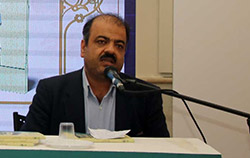The Lack of Attention to the Types of Utilization in Oral History
Akram Dashtban
Fazel Shirzad
2018-7-31
The following text is created based on this question and this field:" What are the pattern of work in the oral history for the rest? Why are these books pattern and what are their characteristics?
Abolfazl Hassanabadi, the director of documents and press unit of Astan Quds Razavi’s[1] Library, said:" The book" Oral History Guide" by Donald Rich can be just named here. Some books, published in the field of oral history, only have the name of oral history but they are not used in their original form.

Referring to a book written in the field of oral history, he added: "The book "Oral History in Iran" is one I have written in this field, in which I have tried to present a definition of oral history based on world standards and paid partly attention on its situation in Iran. Of course, along with the two series articles, I have written about "Interview in Oral History" and "Methodology and Subjects in Urban Studies" that can help the readers in this field.
Hassanabadi went on to say:" Dr. Morteza Nouraee has also written a book entitled "Oral History and Its Place in Iran's Contemporary Historiography in 1358-1385[2]" and said that oral history is an audio or video interview on a topic. Mr. Tatari has also published a book titled "Compilation in Oral History," which was the result of a series of articles on the subject of Oral History. Hassanabadi added:" in the year 1370(1991), Mrs. Bam published a book entitled "Transcription and Editing in Oral History," which somewhat defined a framework, but it should be noted that oral history has a structure and a fluid, diverse nature, and it can't be put in one framework. The standard principles of it should be regarded in order to have an oral history format."
Hasanabadi continued: "Oral history has a separate structure in each of its formats and may have a challengeable structure, or they are different from each other in terms of subject and narration, but there are in common principles on which the title of oral history takes place. Here, we have to categorize the frameworks and model them, and book's approach should be taken into account in compiling the book, which is, as a sample of the book, a literary approach, or a combination of story and reality, or like Mr. Mohsen Kazemi's books, has a particular approach and cannot be considered as an arbitrary one."
He explained standard principles in oral history: "The purposefulness of an interview, audio or video, the presence of the interviewee and interviewer is standard principles in oral history. We may meet standards in the initial production of oral history, but we are so different about using it that there are various types of oral history in the world. Regarding the use of oral history in Iran, of course, we are dropped behind and generally know it only belong in published books."
[1] It is a charitable foundation, in Mashhad, Iran. It is the administrative organization which manages the Imam Reza shrine and various institutions which belong to the organization.
[2] 2006-1979
Number of Visits: 4224








The latest
Memoirs of Hujjat al-Islam Reza Motalebi
Hujjat al-Islam Reza Motalebi is a cleric from Isfahan. Before the revolution, he was the imam of the Fallah Mosque – which was later renamed Abuzar Mosque. By his presence and efforts, Abuzar Mosque soon became a base for supporters of the Imam and the revolution. After the victory of the revolution, he played a role in uniting forces and maintaining political vitality in southwest Tehran.The Necessity of Receiving Feedback in Oral History
Whenever we engage in a task, we naturally seek ways to evaluate our performance — to correct shortcomings and enhance strengths. Such refinement is only possible through the feedback we receive from others. Consider, for instance, a basketball player whose shots are consistently accurate; should he begin shooting blindfolded, his success rate would rapidly decline, as he would be deprived of essential feedback from each attempt.Sir Saeed
The book “Sir Saeed” is a documentary [narrative] of the life of martyr Seyyed Mohammad Saeed Jafari, written by Mohammad Mehdi Hemmati and published by Rahiyar Publications. In March 2024, this book was recognized as one of the selected documentary biographies in the 21st edition of the Sacred Defense Book of the Year Award. The following text is a review on the mentioned book.Morteza Tavakoli Narrates Student Activities
I am from Isfahan, born in 1336 (1957). I entered Mashhad University with a bag of fiery feelings and a desire for rights and freedom. Less than three months into the academic year, I was arrested in Azar 1355 (November 1976), or perhaps in 1354 (1975). I was detained for about 35 days. The reason for my arrest was that we gathered like-minded students in the Faculty of Literature on 16th of Azar ...

